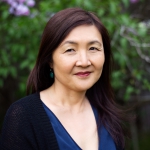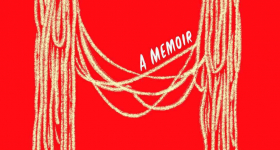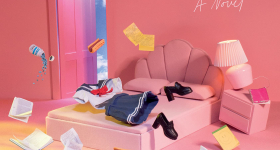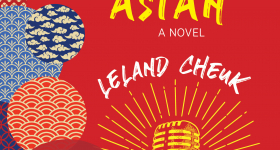Alexander Chee has garnered critical acclaim from TIME, Washington Post, Entertainment Weekly, NPR and was recently named a finalist for the PEN/Diamonstein-Spielvogel Art of the Essay Award. Chee is the author of the novels Edinburgh (Picador, 2002) and Queen of the Night (Houghton Mifflin Harcourt, 2016). He is also an associate professor of English and Creative Writing at Dartmouth College, and a contributing editor at The New Republic as well as editor at large at VQR. He describes his writing experiences in his deeply personal collection of essays, How to Write an Autobiographical Novel (Mariner Books, 2018). In response to one of the interview questions we exchanged over email, Chee replied: “Find a way to tell a story to learn who you are and teach it to yourself also.” It’s a powerful call to all of us.
JIMIN HAN: The dedication in How to Write an Autobiographical Novel is: “To my mother and father, who taught me how to fight.” Since this dedication appears in a collection of essays on writing, what do you mean by “fight”?
ALEXANDER CHEE: In the case of my father, it is literally fighting. Everything from refusing to allow anyone to stop you, to when he had me training on a boxing bag as a kid when I was being bullied, to studying taekwondo. In the case of my mother, I mean activism and speaking out about what I think is right.
One thing I did have to face is the way in which my father refused to ever acknowledge the way racism affected him. And breaking the silence around that did feel like betraying him, a little bit. He was a very proud man and was determined to never let anyone know he struggled. Didn’t want to give his enemies the satisfaction.
JH: The lyricism of your writing, particularly your use of verbs to convey abstract and elusive concepts throughout this collection produced so many gratifying moments for me — moments of admiration and inspiration. Two quick examples: “Pushed in around the shape of a story” from “The Autobiography of My Novel” and “My high cheekbones, large slanting eyes, wide mouth, small chin and rounded jaw have been restrung in base, powder, eyeliner, lipstick, eyebrow pencil” from “GIRL.” What was the revision process of these essays like for you?
AC: Revision for me usually involves learning the true shape of what I'm working with — what the essay is truly about. There's the idea that leads you into the forest of the self, and then the idea you find there. The language you mention, all of that is something I teach my students about making abstract and elusive concepts into something the reader can encounter through their senses, giving a more explicit description of the internal event and the emotion — ways we can make it very specific. We experience our lives from inside of ourselves, and this is something we can share through writing, but to do so we have to dress it up in the language of the senses. So revising for me involved asking myself, what are those moments that are elusive, and have to be made more physical, more expressive? Or, even, how can I use visual storytelling on the page? I wasn't just making myself a character on the page, but my feelings and ideas, also. I had long pondered the way comics can use a visual pun as a character, and tell two stories at the same time in the process, and I've been experimenting with that, in prose.
JH: How did you decide which essays would be in this collection and which essays didn’t make it in?
AC: I simply began with favorites, and then began to look at the seeming connections between them. I was selecting from roughly 70 essays to begin with, of my published work, and then there were unfinished essays I knew I wanted to finish and present. Ten of the essays here were published previously, six were not. Of those six, they had lingered unfinished or unrevised in my drafts for as long as 20 years, like "Girl." I used the book to push myself to finish them. My agent, Jin Auh, provided the first feedback on what belonged, and then gave opinions throughout; my editor, Naomi Gibbs, also did, and suggested the writing of the essay about money, "Inheritance." I will publish a few more collections around themes, then. The next one is probably called “Rich Children.”
JH: How did you arrive at the title?
AC: As I looked over the essays I wanted to include, I just felt the title essay was the clear winning title. A gut feeling. It was the title that allowed for the most room in the book, in terms of the other essays, and so that allowed for it to become what it became.
JH: Can you talk a bit about how you felt about writing about people in your life in these essays and how you handled issues of privacy?
AC: The simplest answer is that I followed both the laws — the book received a legal review, and in any situation where I was asked by the lawyers to make changes, I did — and before that, I worked with a knowledge of those laws, and then also worked deliberately, collaboratively, as possible, with the subjects, in what I think of as both the ethical way to proceed but also a best practice. In "On Becoming an American Writer," for example, I spoke to the survivor of my friend and asked for permission to refer to her elegy for her. She agreed, even sent me the elegy itself. In "Autobiography of My Novel," I wrote to my friend, Adina Hoffman, and asked her about her comments. In "My Parade," I wrote to Deborah Eisenberg and asked her about what I recalled of her comments, and she offered clarifications I used. She was even someone who had modeled this for me — many years ago, she had asked me for permission to possibly use something I'd said in conversation in a story. She took pains to explain this almost never happened, and so I was honored but also I learned how to respect another writer while writing — any person, really. The answers you get back are sometimes more interesting than what you remembered, and after a while, that becomes more of a reward than "not getting in trouble."
JH: What has the response been to your essay collection? Anything surprise you? Anything you wish could have happened around this book?
AC: It’s been wonderful. I’ve been incredibly happy to meet so many people this year through the book, and grateful for the way the book has been embraced by readers, especially my queer and Asian American and Mixed and Hapa readers, and my fellow survivors of sexual abuse, racism, the 90s, neoliberalism and Republican minority rule. All of my readers matter to me, but queer Asian American visibility, especially for Korean Americans, is on my mind a lot lately.
I've been deeply gratified especially by how often people have told me the book has allowed them to work through their own trauma, or write, or find the courage to return to writing or has given them some courage in this political climate — some mixture of these. But especially how many people feel seen by the book, so many seemingly different people.
And the critical reception also has been wonderful. But that time of year when the best of lists come is always nerve wracking — and being named to Publishers Weekly’s Top Ten Books of the Year was wonderful, and now Time Magazine’s Top Ten Nonfiction and NY Magazine’s Top Ten of the Year. If I were to wish for anything further, I might like to see the collection adapted for television, a kind of High Maintenance-style show about being a writer, a gay man in the 90s and a teacher of writing — my adventures, I guess, in prose — but it would cross more time. Who knows? I have learned the easiest way to be disappointed is to hope for a single thing.
JH: I still hear from young Asian Americans that they struggle with making a commitment to writing, whether it’s due to time and/or further education. What would you like to say especially to Asian Americans interested in writing and the arts?
AC: That we need you. And that you should never doubt it. If I ever doubted the importance of what I do, I don’t anymore after this tour.
People like to act as if teaching fiction is frivolous but it is dead serious. You can’t tell a story you don’t care about. To tell a story to the end, it has to come from something that matters to you, enough to see it through, and that’s why taking those classes teaches you something even if you don’t become the next Chang-rae Lee or Amy Tan or Kevin Kwan. You are forced to confront what you care about. And so when my students don’t necessarily want to go on to become writers, I get it — they’ve met what they want in themselves and that matters more. That’s the value of teaching creative writing in a liberal arts setting.
That said, we need your stories, the ones you’re living and the ones you’ll write. I get it — the pressure to survive capitalism is real. Families may react negatively to the idea of your being a writer, may demand certain professional choices as a part of paying for your education. But then I think of how long we’ve been in this country, how easy it is to erase us when our stories aren’t told and how this thing we do as writers is a way of asserting our place in the culture. We are here, have been here and our silence will be taken for consent when they try to erase us. Don’t give it. Instead, find a way to tell a story to learn who you are and teach it to yourself also, and keep doing it. This is how we make this world and the next.










Comments